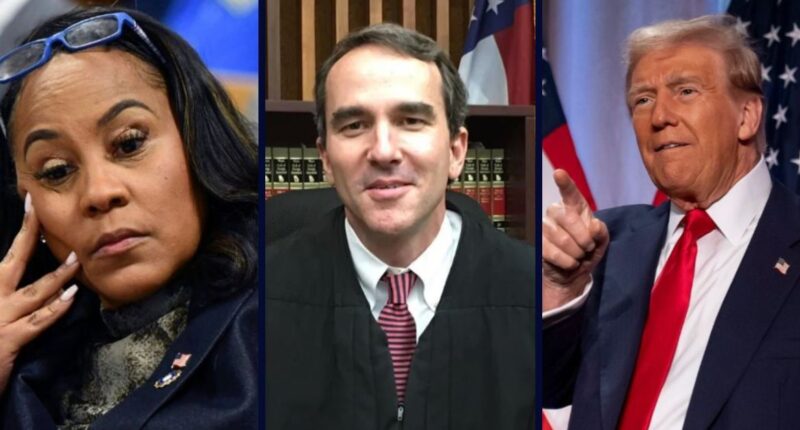
Left: Fulton County District Attorney Fani Willis is seen during a hearing related to defendant Harrison Floyd, who is a prominent figure in the organization Black Voices for Trump accused in the Georgia election indictments on November 21, 2023, in Atlanta (Dennis Byron/Hip Hop Enquirer via AP, File). Center: The image shows Judge Benjamin A. Land from the Judicial Council of Georgia/Georgia Courts Journal. Right: President-elect Donald Trump is photographed arriving to address a House GOP conference meeting on November 13, 2024, in Washington (AP Photo/Alex Brandon).
The decision by the Georgia Court of Appeals on Thursday morning to scrap Fulton County District Attorney Fani Willis and her office from the state’s felony prosecution of Donald Trump came with a strong rebuke from one of the court’s three appellate judges, who dissented on account of being “particularly troubled” with the circumstances surrounding the move.
“We have no authority to reverse the trial court’s denial of a motion to disqualify,” wrote Judge Benjamin Land in his dissent. “None.”
The Peach State’s three-judge appeals panel agreed in a 2-1 ruling to have Willis and her office removed from the Trump case — holding that the trial court erred in allowing Willis and her office to remain on board after concluding that a romantic relationship between Willis and former special prosecutor Nathan Wade resulted in the “significant appearance of impropriety” and created a conflict of interest due to pecuniary motives.
Trump and his co-defendants have been pushing to have Willis and the Fulton County DA’s Office axed since January. His case out of Fulton County centers on accusations that the president-elect, as well as 18 others, conspired to overturn his 2020 election loss in Georgia.
Trump’s indictment accuses the former and future POTUS of beseeching then-Georgia Secretary of State Brad Raffensperger in an attempt to “find” enough votes so that Trump would carry the battleground state and attempted to get Republican state lawmakers to appoint a different slate of college electors that would vote in Trump’s favor.
Willis and Wade’s “private” relationship became public in February as part of the filed court documents seeking to disqualify them from the case, along with the Fulton County DA’s Office. In March, Fulton County Superior Judge Scott McAfee ruled that while Willis had shown “a tremendous lapse in judgment” she could remain on the case, so long as Wade was removed, which he was.
The defendants were granted an immediate appeal, leading to Thursday’s 2-1 majority decision in their favor.
“After carefully considering the trial court’s findings in its order, we conclude that it erred by failing to disqualify DA Willis and her office,” Judge Trenton Brown wrote in the majority opinion on Thursday, with support from Judge Todd Markle.
“The remedy crafted by the trial court to prevent an ongoing appearance of impropriety did nothing to address the appearance of impropriety that existed at times when DA Willis was exercising her broad pretrial discretion about who to prosecute and what charges to bring,” Brown said. “While we recognize that an appearance of impropriety generally is not enough to support disqualification, this is the rare case in which disqualification is mandated and no other remedy will suffice to restore public confidence in the integrity of these proceedings.”
In his dissent, Land detailed how he was taken aback by the majority’s decision to not defer to McAfee’s ruling and what he referred to as a refusal to exercise “restraint.” Land insisted that “the law does not support the result reached by the majority” — saying, “we are not trial judges,” and shouldn’t act as such.
“I am particularly troubled by the fact that the majority has taken what has long been a discretionary decision for the trial court to make and converted it to something else entirely,” Land argued. “If this Court was the trier of fact and had the discretion to choose a remedy based on our own observations, assessment of the credibility of the witnesses, and weighing of the evidence, then perhaps we would be justified in reaching the result declared by the majority. But we are not trial judges, and we lack that authority.”
Given the “unique role of the trial court,” Land claimed it was McAfee who had “broad discretion to impose a remedy that fits the situation as it finds it to be,” not the appellate judges.
“We should not lightly interfere with their work or weaken their discretion by imposing our will because we don’t like the result,” Land said. “We should resist the temptation to interfere with that discretion, including its chosen remedy, just because we happen to see things differently. Doing otherwise violates well-established precedent, threatens the discretion given to trial courts and blurs the distinction between our respective courts.” Land claimed that he was “respectfully” dissenting because he was “convinced that is what the majority has done” in this case.
“Our role as appellate judges is critically important, but it often requires restraint,” Land concluded. “We are here to ensure the law has been applied correctly and to correct harmful legal errors when we see them. It is not our job to second-guess trial judges or to substitute our judgment for theirs. We do not find the facts but instead defer to the trial court’s factual findings where there is any evidence to support them.”
Willis also kept the wheels turning in her racketeering (RICO) prosecution of Trump last week too, despite the pending appeal, with a public nixing of requests made by congressional investigators for documents related to her office’s correspondence with special counsel Jack Smith over criminal probes involving the future POTUS.











